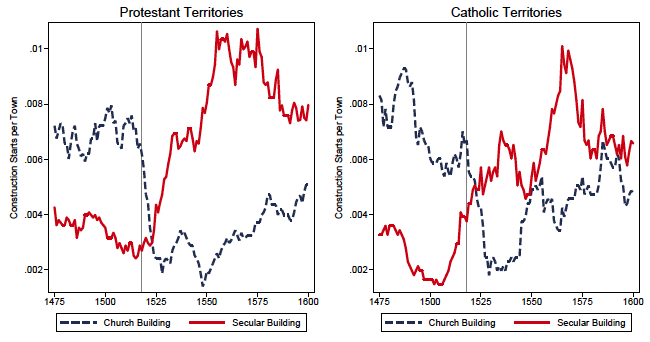
The Protestant Reformation was a transformative period in European history that reshaped religious, social, political, and economic landscapes. Initiated by Martin Luther’s “95 Theses” in 1517, the Reformation signaled a significant shift from the absolute authority of the Catholic Church towards individual interpretation of faith and the emergence of various Protestant sects.
Religious Disruption and Fragmentation

The Reformation fundamentally challenged the religious monopoly of the Catholic Church. Reformers like Martin Luther and John Calvin questioned papal authority, leading to a fragmentation of Christian beliefs and practices across Europe. The Reformation resulted in the establishment of multiple Protestant denominations, altering the previously unified Christian landscape. For instance, Martin Luther asserted that the Bible should be the sole authority for Christians, contradicting the long-held traditions supported by the Catholic Church[4][7]. This dissent initiated a sequence of religious upheavals, including wars and persecutions, as seen in the subsequent Catholic Counter-Reformation, which aimed to solidify papal authority and combat Protestant beliefs[4][7].
The Reformation also fostered a newfound emphasis on personal faith and direct relationship with God, moving away from the ecclesiastical intermediaries that characterized Catholic practice. This shift empowered individuals to interpret the scriptures independently, which was significantly facilitated by the invention of the printing press, allowing for mass dissemination of religious texts and ideas[7]. Consequently, literacy rates improved, particularly among Protestant communities, as reading the Bible became a personal duty rather than a clerical obligation[8].
Political Transformations

The Reformation had profound political implications, catalyzing the rise of nation-states and altering the dynamics of power in Europe. With the decline of the Catholic Church's influence, secular rulers gained unprecedented authority. This transition was particularly evident in countries like England, where Henry VIII established the Church of England, seizing control over its governance and assets[4][5]. The resulting political fragmentation forced rulers to engage more directly with their subjects and clergy, leading to power struggles that defined European political landscapes for centuries.
The Reformation’s challenge to clerical authority was echoed in the governance systems established in Protestant regions, which tended to be more aligned with secular interests than with Church doctrine. For example, as monasteries were closed and their wealth redistributed, many local rulers became increasingly secular in their governance, utilizing religious competition to enhance their political legitimacy[5]. Over time, this led to a broad secularization of political authority across Europe, differentiating between religious and secular spheres of influence and establishing a framework for future democratic governance[5].
Economic Shifts and Growth

Economically, the Reformation is often linked to the rise of capitalism and the development of a 'Protestant work ethic.' Scholars like Max Weber argued that Protestant beliefs, particularly those emphasizing hard work and individual responsibility, contributed to economic prosperity in Protestant regions[3]. The Reformation's promotion of literacy and education also played a crucial role in fostering a more educated workforce, which was essential for economic development[3][8].
Research has shown a correlation between Protestantism and higher economic performance, with significant differences in wealth observed between Protestant and Catholic regions. For instance, communities that adopted Protestant reform often saw increases in individual and societal wealth due to enhanced literacy and labor productivity fostered by Protestant ideologies[3]. The emphasis on education, literacy, and individual entrepreneurship facilitated significant economic growth in the burgeoning nation-states of the time.
Cultural and Social Changes

Culturally, the Reformation spurred significant intellectual movements, encouraging a reevaluation of traditional beliefs and practices that influenced later Enlightenment thinkers. The questioning of established norms led to increased curiosity and consideration of secular philosophies, promoting ideas of democracy and individual rights[8]. This intellectual shift also fueled the expansion of universities and scholarly pursuits across Europe, fostering environments where new ideas could flourish[7].
Socially, the Reformation induced changes in the family structure and roles, as the focus on individual interpretation of faith often translated into new dynamics within households. Moreover, as Protestant groups advocated for various social reforms, including education for all, the implications for gender roles began to evolve, leading to broader discussions about rights and responsibilities beyond mere religious duties[3][6].
Conclusion
In conclusion, the Reformation stands as a critical juncture in European history, influencing religious beliefs, political authority, economic practices, and cultural identities. Its legacy remains evident in the modern secular state structures and the diversity of Christian practices that continue to shape the cultural and political fabric of Europe today. The interplay between religion, politics, and society during this period laid foundational frameworks that defined the trajectory of Western civilization, ushering in the modern age characterized by individual rights and pluralistic beliefs.
Get more accurate answers with Super Search, upload files, personalized discovery feed, save searches and contribute to the PandiPedia.
Let's look at alternatives:
- Modify the query.
- Start a new thread.
- Remove sources (if manually added).
- Request a manual search from our human research team.